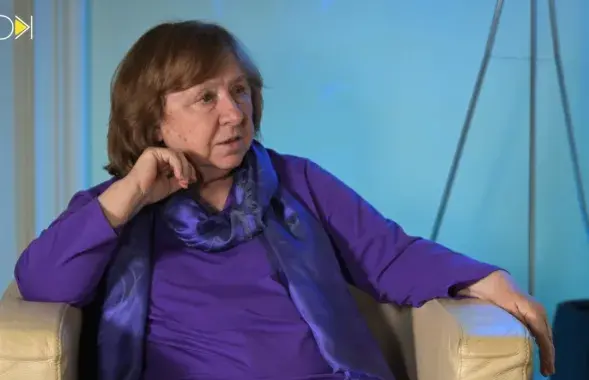Mikalai Snapkou: “We cannot call the state a bastard!”
The Minister of Economy has told why he avoids the word "liberalization" and what will happen if you bring an anti-crisis programme from the street.
I came to the Minister of Economy, Mikalai Snapkou, "as a partisan" (his words): having arranged a personal appointment. However, when the truth came out, Mikalai Snapkou did not refuse to give an interview. As it was revealed in our further conversation, Euroradio was lucky as the Minister tried to "train himself not to push people away".
A secretary put a cup of coffee on the table before the Minister. He took a sip and took out an expensive cigarette with a cigar-holder. The Minister keeps his ash-tray in the upper drawer.
Euroradio: Many people think that you are an adherent of liberalization. Is it really so?
Mikalai Snapkou: “I am not an adherent of liberalization. However, if we look at the root of this word, naturally, I am an adherent of liberty. It is the liberty of business undertakings, opportunities, self-responsibility and responsibility for yourself and your family before the society, and vice versa. It should not be a one-way street. We cannot call the state a bastard because it has failed to build a foot-path leading from the highway to my house.
I may seem too verbose, but this is my perception of liberty as relations between a person and the society from the point of view of potential opportunities. From the point of view of the economic process, liberalization has become a common word. I like "common sense" better.
Euroradio: What do you mean by "common sense"?
Mikalai Snapkou: “The common sense of economic processes that is needed for stable and long-term development. Common sense. I think that common sense is one of the constituents of freedom”.
Euroradio: Do you think that it contradicts liberalization?
Mikalai Snapkou: "Naturally, it doesn't. However, I consciously avoid this word, as there are too many speculations around it. There are economic laws. And there are economic laws complying with our mentality and the current situation. So we need to train ourselves. I also need to be trained as an official who is responsible for this or that part of the country's economic policy. I need to train myself every day in order to... For example, not to turn you away today. Not to turn away the suggestions that we receive.
For instance, I am very busy, I have a lot of paperwork to do, and a person comes to express a thought. I can turn him away, but there is this everyday self-training: a citizen's opinion and the opinion of the society should be important to me even if I think that I am a great specialist and have super-experts who graduated from London schools and know the economic laws and directions of the economic policy better than the person who wants to take part in the process".
Euroradio: Do you think that liberalization is to blame for the inflation, and will this crisis turn our government away from liberalization?
Mikalai Snapkou: The issue of liberalization influenced part of the inflation process. It influenced only part of it, as the inflation was mostly caused by monetary factors. We cannot say that our society is ready for liberalization and realizes that this is good at the moment. On the contrary, the majority say: "This is bad! We do not want inflation!" At the same time, entrepreneurs say: "We cannot work, we are limited by the prime cost formation, structure of expenses, markups, retail margin… You hinder our development!”. Where is the golden middle? The sound golden middle should be the regulatory function of the state.
Euroradio: Do many people bring their anti-crisis programmes to the Ministry of Economy?
Mikalai Snapkou: “There are some suggestions. Some people send their suggestions to my website, and I am very grateful for it! There are positive and negative ones, and there are also discourteous and emotional messages. This is not very good, but what can I do? The majority of suggestions come from business unions. We worked a lot with them using Directive No. 4, and I am also very grateful to them. I would also like to thank Ms. Hrynyuk - she accepted the invitation to take part in our work quickly and creatively. We will continue distributing the principles of SWOT-analysis all over the country together with her. SWOT-analysis means the evaluation of strengths, weaknesses and threats... It's a very effective approach. I think we will teach our enterprises to plan their activity using SWOT-analysis with her help”.
Euroradio: Why a formation like the anti-crisis headquarters that should generate and estimate suggested variants of overcoming the economic problems has not been created in Belarus yet?
Mikalai Snapkou: “When the Ministry of Economics sees a problem, we summon a small working group operatively. We work and implement the results in practice. Maybe it does not always happen quickly enough or it is not effective enough, but I like this type of work better. I do not want things to be like in the joke "What do the Japanese and Russians do when they run out of fish? The Japanese go fishing and the Russians create a commission to decide what to do when they run out of fish". Alongside with that, a civil advice council works on a steady basis. I would like to mention the work of Mr. Shvets and Mr. Karahin. I should say that they work aggressively and eagerly”.
Euroradio: However, the civil advice council does not deal with the present issues such as the price regulation.
Mikalai Snapkou: "As for anti-crisis measures and prices, we have a department for price formation. It monitors and controls the situation. However, our approach to the issues of price formation and the anti-monopoly policy is very careful. We minimize... This is not even a regulatory function. But we need to be careful about the price formation now in order not to spoil what we did before. It's a complicated process; every inaccurate step may result in a wave of negativism at the level of entrepreneurship or at the state level. We need to be accurate and calm. Moreover, we are sure that the prices will get balanced as much as it is possible in our situation, taking into account the disparity of prices with our Eastern neighbour. The disparity does exist and we should understand that we will subsequently get closer to each other. How long will it take? We will see".
Euroradio: So, it turns out that there are several anti-crisis teams.
Mikalai Snapkou: “As for the anti-crisis headquarters, we have it. It is called the Presidium of the Council of Ministers. New formations are not always more effective than the old ones. The Minister of Finance and I, we are both members of the Presidium. Frankly speaking, looking at the situation here, I can do things that I consider reasonable there. Furthermore, representatives of the National Bank also attend out meetings.
We thought of creating the so-called decision-making group. From 3 to 10 people should take a decision, and it will be fulfilled. It is the real Presidium and it includes the people the Presidium wishes to involve in the work as experts. And it is done this way as I always doubt that the taken decision is correct. There is no fire without smoke. Any medal has two sides. Any stick has two ends. Who in this world can claim that the words he said or the decision he took is the correct one?”
Euroradio: We know some experts who do not bring their anti-crisis programmes to the Ministry of Economy because they are worried about copyright issues…
Mikalai Snapkou: “I officially state that if I accept somebody's suggestion I will definitely obey the copyright law and will not claim to be the author. Moreover, I am ready to offer employment to authors if they like”.
Photo by: web-site of the Belarusian Ministry of Economy.















